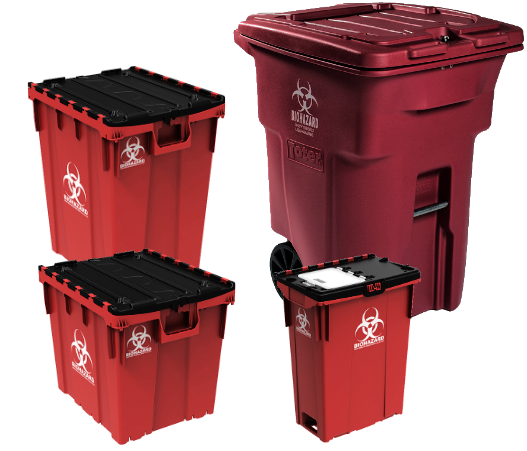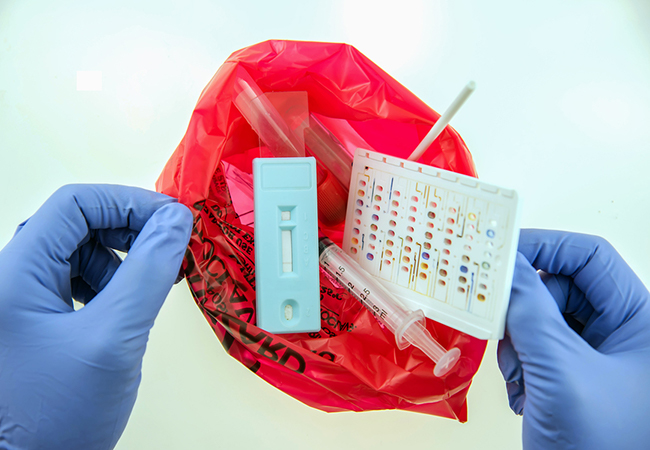Proactive Wellness Solutions: Choosing the Best Medical Waste Removal Near You
Proactive Wellness Solutions: Choosing the Best Medical Waste Removal Near You
Blog Article
Stay Ahead of Laws: Professional Suggestions on Medical Waste Disposal
In a world where the health care industry is constantly advancing, it is important for medical centers to remain in advance of guidelines when it comes to the appropriate disposal of medical waste. From comprehending the different groups of clinical waste to implementing the appropriate collection and partition methods, this conversation will provide workable tips and beneficial understandings to aid facilities remain ahead of laws in the ever-changing landscape of medical waste disposal.
Understanding Clinical Waste Categories
Comprehending clinical waste classifications is necessary for proper disposal and monitoring in medical care facilities. Clinical waste describes any type of waste created by health care tasks that may posture a risk to public wellness or the environment. It is vital to categorize clinical waste properly to ensure its risk-free handling, transport, disposal, and treatment.
There are numerous categories of clinical waste that medical care facilities require to be knowledgeable about. The most typical categories consist of transmittable waste, pathological waste, sharps waste, pharmaceutical waste, and chemical waste. Each category has particular guidelines and guidelines for its correct monitoring and disposal.
Infectious waste includes materials infected with blood or various other bodily fluids, such as gloves, gowns, and lab societies. Pathological waste describes human cells, organs, or body parts that require special handling and disposal. Sharps waste consists of made use of needles, syringes, and various other sharp things that can cause injury and transmit infections. Pharmaceutical waste consists of expired, extra, or contaminated drugs that require careful handling and disposal. Finally, chemical waste includes solvents, disinfectants, and other chemical compounds utilized in medical care centers.
Remaining Up-To-Date With Regulatory Changes
Staying present with regulative changes is important for health care facilities to ensure compliance and appropriate monitoring of medical garbage disposal. medical waste removal service. With guidelines regularly developing, it is crucial for health care centers to remain current to stay clear of penalties, fines, and potential harm to the setting and public health and wellness
To stay in advance of governing modifications, medical care centers ought to establish a system for tracking and tracking updates. This can be done by signing up for regulative newsletters, going to workshops and seminars, and actively getting involved in sector organizations. In addition, centers should mark a personnel or team in charge of remaining informed and sharing info to relevant stakeholders.
Normal communication with governing agencies is likewise important. Health care facilities should establish connections with local, state, and government firms to ensure they know any changes in guidelines that may impact their waste monitoring practices. This can be done via routine conferences, participation in public comment periods, and proactive interaction with regulative firms.
In addition, health care facilities need to take into consideration partnering with waste monitoring business that focus on medical garbage disposal (medical waste disposal services with WasteX). These companies are typically fluent in the latest regulations and can give guidance and assistance to guarantee compliance
Implementing Proper Collection and Segregation Techniques
To successfully manage medical waste disposal, health care facilities need to establish correct collection and segregation approaches based on governing guidelines. Implementing these methods guarantees the risk-free handling and disposal of potentially hazardous materials, shields the setting, and minimizes the risk of infections and injuries to health care employees and the basic public.
Correct collection and segregation approaches entail using designated containers and classifying systems. Medical care centers must offer clearly labeled containers for different kinds of clinical waste, such as sharps, contagious waste, pharmaceutical waste, and non-hazardous waste. These containers need to be color-coded and clearly significant to avoid confusion and advertise very easy recognition.
Furthermore, medical care facilities need to train their team on the correct procedures for accumulating and segregating clinical waste. This consists of educating additional info them on the various kinds of waste, the appropriate containers to use, and the relevance of complying with policies and guidelines. Normal training sessions and refresher training courses need to be performed to make sure that personnel stay updated on finest techniques.
Moreover, medical care centers must establish a system for routine collection and disposal of clinical waste. This may involve partnering with licensed waste monitoring firms that concentrate on medical garbage disposal. These firms will certainly ensure that the collected waste is carried and thrown away in compliance with governing needs.
Picking the Right Disposal Methods

Incineration is among the most effective and usual techniques for disposing of specific sorts of clinical waste, such as pathological waste and sharps. It entails the regulated combustion of pop over to these guys waste at high temperature levels, reducing it to ash. Nevertheless, incineration can launch harmful contaminants into the air and add to air pollution.

Chemical therapy includes the usage of chemicals to counteract the waste and decontaminate. Microwave therapy makes use of microwave energy to warm and disinfect the waste.
Making Certain Conformity Through Documents and Training
After carefully considering the ideal disposal techniques for medical waste, healthcare facilities need to ensure compliance with policies and minimize environmental influence by executing effective documentation and training treatments. This action is critical in keeping a risk-free and sustainable environment for both medical care employees and the public.

Medical care workers who handle medical waste needs to obtain appropriate training on waste segregation, dealing with, and disposal treatments. By offering thorough training, health care centers can empower their team to make enlightened choices and lessen the risk of inappropriate waste disposal.
Final Thought
To conclude, remaining in advance of policies in clinical waste disposal is crucial for medical care facilities. medical waste removal. Comprehending the different groups of medical waste, remaining upgraded with regulative modifications, executing proper collection and segregation approaches, selecting the suitable disposal methods, and ensuring conformity with documentation and training are all important actions. By complying with these guidelines, medical care organizations can properly take care of and dispose of clinical waste in a risk-free and responsible way
From comprehending the various classifications of clinical waste to carrying out the best collection and partition methods, this conversation will supply useful understandings and actionable pointers to help centers stay ahead of regulations in the ever-changing landscape of clinical waste disposal. - medical waste disposal services with WasteX
The most usual groups include infectious waste, pathological waste, sharps waste, pharmaceutical waste, and chemical waste. Health care facilities must give clearly labeled containers for different types of medical waste, such as sharps, contagious waste, pharmaceutical waste, and non-hazardous waste. Health care facilities must establish a detailed system to tape and track all elements of clinical waste disposal, including types of waste produced, quantities, and disposal techniques used. Health care workers who handle medical waste should receive appropriate training on waste segregation, dealing with, and disposal procedures.
Report this page